If you’ve been following my blog posts it will come as no surprise that my gaming preferences tend toward large, immersive, heavily themed games. These games also tend to come with equally heavy price tags running somewhere in the $40 to $60 range. However, you don’t have to spend a fortune to find an interesting game with plenty of theme. In honor of Cyber Monday I’ve created this list of 10 games, each with a strong science fiction or fantasy theme that retail for $20.00 or less.
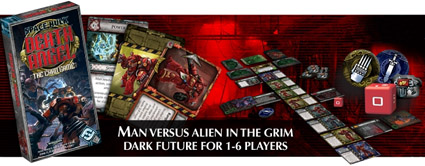
Command a combat team of Warhammer 40K Space Marines and join a Blood Angel assault squad as they fight deck by deck through a derelict space hulk attempting to eradicate the Genestealer infestation. Space Hulk: Death Angel – The Card Game is a cooperative game for 1 to 6 players designed by Corey Konieczka for Fantasy Flight Games that miraculously distills much of the brutal full-sized Space Hulk game into a challenging, compact, fast playing, 30 minute game. $16.71 – $19.95 in-store and online at Borders, Barnes & Noble, Boards & Bits (online only).
Join a team of adventurers attempting to recover four sacred treasures from a sinking island paradise. Forbidden Island is a cooperative game for 2 to 4 players. Each player chooses one of six available specialists; pilot, engineer, diver etc… Players then race between beautifully illustrated island tiles attempting to recover the relics and escape in the waiting helicopter before the island is completely engulfed by water. 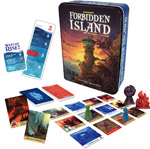 Forbidden Island is simple to learn yet challenging to beat with absolutely wonderful components for a game in this price range. Forbidden Island plays in about 30 minutes and is the perfect light game for casual players or an introductory game for younger teens. $14.07 – $15.95 at Amazon.com, Barnes & Noble, Borders (in-store only), and other online sources.
Forbidden Island is simple to learn yet challenging to beat with absolutely wonderful components for a game in this price range. Forbidden Island plays in about 30 minutes and is the perfect light game for casual players or an introductory game for younger teens. $14.07 – $15.95 at Amazon.com, Barnes & Noble, Borders (in-store only), and other online sources.
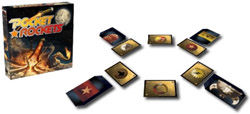 Pocket Rockets is a clever rocket-building card game for 2 to 4 players with fun, quirky artwork that plays in about 20 minutes. Players move around a circular assembly line gathering new rocket parts, recycling old parts, picking up fuel, or reversing movement of the line. Game play is quick but surprisingly satisfying with a push-your-luck feel. Bigger rockets score better but risk ending the game unfinished, some rocket capsules provide additional scoring or other play benefits for increased strategy. $8.31 – $10.50 at various online specialty stores.
Pocket Rockets is a clever rocket-building card game for 2 to 4 players with fun, quirky artwork that plays in about 20 minutes. Players move around a circular assembly line gathering new rocket parts, recycling old parts, picking up fuel, or reversing movement of the line. Game play is quick but surprisingly satisfying with a push-your-luck feel. Bigger rockets score better but risk ending the game unfinished, some rocket capsules provide additional scoring or other play benefits for increased strategy. $8.31 – $10.50 at various online specialty stores.
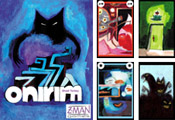 Onirim is a 15 minute, solo or two player cooperative card game where the players take the roles of Dreamwalkers lost in a mysterious labyrinth looking for the 8 oneiric doors to the waking world before dreamtime expires and they become trapped. This game features highly stylized, abstract watercolor art in keeping with its theme. Onirim game play is also somewhat abstract and puzzle-like, players lay out cards in a dreampath following simple rules for placement while trying to avoid nightmares and the penalties they produce. Play the correct sequence of cards and one of the doors may be found. Three mini-expansions are included in the box to provide variety in game play. $6.00 – $7.99 at various online specialty stores.
Onirim is a 15 minute, solo or two player cooperative card game where the players take the roles of Dreamwalkers lost in a mysterious labyrinth looking for the 8 oneiric doors to the waking world before dreamtime expires and they become trapped. This game features highly stylized, abstract watercolor art in keeping with its theme. Onirim game play is also somewhat abstract and puzzle-like, players lay out cards in a dreampath following simple rules for placement while trying to avoid nightmares and the penalties they produce. Play the correct sequence of cards and one of the doors may be found. Three mini-expansions are included in the box to provide variety in game play. $6.00 – $7.99 at various online specialty stores.
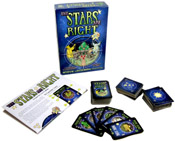 The Stars are Right is a Cthulhu themed puzzle game played with tiles and cards for 2 to 4 players that can be completed in about one hour. Players are cultists attempting to summon Great Old Ones by rearranging the night sky. The sky is a 5 x 5 grid of tiles, each printed with constellations, comets, solar eclipses or other celestial symbols. Cards allow players to shift rows, columns, exchange or flip tiles in an attempt to match specific patterns required for summoning. Early in the game players focus on summoning lesser minions with easy to match patterns, when properly played these minions may assist in summoning mythos creatures of increasing strength by chaining together moves or simplifying the patterns required. The Stars are Right is an interesting game for players good at pattern recognition and with the ability to visualize how moving tiles will affect those patterns. For players without those strengths this game may feel like torture. $17.99 at CoolStuffInc.com and various other online specialty stores.
The Stars are Right is a Cthulhu themed puzzle game played with tiles and cards for 2 to 4 players that can be completed in about one hour. Players are cultists attempting to summon Great Old Ones by rearranging the night sky. The sky is a 5 x 5 grid of tiles, each printed with constellations, comets, solar eclipses or other celestial symbols. Cards allow players to shift rows, columns, exchange or flip tiles in an attempt to match specific patterns required for summoning. Early in the game players focus on summoning lesser minions with easy to match patterns, when properly played these minions may assist in summoning mythos creatures of increasing strength by chaining together moves or simplifying the patterns required. The Stars are Right is an interesting game for players good at pattern recognition and with the ability to visualize how moving tiles will affect those patterns. For players without those strengths this game may feel like torture. $17.99 at CoolStuffInc.com and various other online specialty stores.
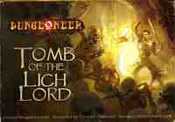 Dungeoneer: Tomb of the Lich Lord is a neat little dungeon crawl for 2 to 4 players that plays in about an hour. Each player is dealt one of four fantasy heroes, each with their own specific stats. The object is to be the first to complete three quests, two specific to each player, one all players are competing to complete. Cardboard counters representing the heroes are moved over dungeon cards that are laid out each turn. A player’s hand may contain spells and items to benefit their hero as well as monsters to challenge and stall the progress of other players. To keep costs to a minimum, Dungeoneer does not include the required 6-sided dice (one or two per player) and game markers other than the heroes (pennies would suffice). Dungeoneer: Tomb of the Lich Lord is just one in an entire series of Dungeoneer games including Vault of the Fiends, Haunted Woods of Malthorin, Den of the Wererats, and Dragons of the Forsaken Desert. Each of these games are complete and do not require other sets for play. $13.95 – $15.95 at Amazon.com and various other online specialty stores.
Dungeoneer: Tomb of the Lich Lord is a neat little dungeon crawl for 2 to 4 players that plays in about an hour. Each player is dealt one of four fantasy heroes, each with their own specific stats. The object is to be the first to complete three quests, two specific to each player, one all players are competing to complete. Cardboard counters representing the heroes are moved over dungeon cards that are laid out each turn. A player’s hand may contain spells and items to benefit their hero as well as monsters to challenge and stall the progress of other players. To keep costs to a minimum, Dungeoneer does not include the required 6-sided dice (one or two per player) and game markers other than the heroes (pennies would suffice). Dungeoneer: Tomb of the Lich Lord is just one in an entire series of Dungeoneer games including Vault of the Fiends, Haunted Woods of Malthorin, Den of the Wererats, and Dragons of the Forsaken Desert. Each of these games are complete and do not require other sets for play. $13.95 – $15.95 at Amazon.com and various other online specialty stores.
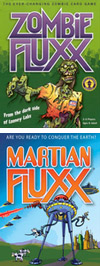 Zombie Fluxx, Martian Fluxx—the Fluxx series of games from Loony Labs have become a bit of a phenomenon. Each of these games follow the same general mechanics—they are card games that begin with two very simple rules; draw one card, play one card. Each card played then adds, subtracts, or modifies existing rules including creating or changing victory conditions. Fluxx games support 2 to 6 players and play in about 30 minutes. Fluxx games are also excellent cross-over games, easy enough to teach casual gamers yet interesting enough to hold the attention of most experienced gamers. Zombie Fluxx: $12.99 at Amazon.com and various other online specialty stores. Martian Fluxx: $12.79 at Amazon.com and various other online specialty stores.
Zombie Fluxx, Martian Fluxx—the Fluxx series of games from Loony Labs have become a bit of a phenomenon. Each of these games follow the same general mechanics—they are card games that begin with two very simple rules; draw one card, play one card. Each card played then adds, subtracts, or modifies existing rules including creating or changing victory conditions. Fluxx games support 2 to 6 players and play in about 30 minutes. Fluxx games are also excellent cross-over games, easy enough to teach casual gamers yet interesting enough to hold the attention of most experienced gamers. Zombie Fluxx: $12.99 at Amazon.com and various other online specialty stores. Martian Fluxx: $12.79 at Amazon.com and various other online specialty stores.
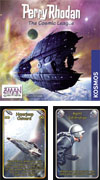 Perry Rhodan: The Cosmic League is a two player card game set in the Perry Rhodan universe and illustrated by Swen Papenbrock, a contributing artist to the Perry Rhodan series. Perry Rhodan: The Cosmic League is an economic/transport game. Each player starts with a basic spacecraft that can transport only one commodity at a time. Delivery of these commodities between planets rewards victory points which may be saved or spent on ship upgrades. Perry Rhodan: The Cosmic League is simple and elegant and may be played in about 60 minutes. $15.49 – $19.99 at various online specialty stores.
Perry Rhodan: The Cosmic League is a two player card game set in the Perry Rhodan universe and illustrated by Swen Papenbrock, a contributing artist to the Perry Rhodan series. Perry Rhodan: The Cosmic League is an economic/transport game. Each player starts with a basic spacecraft that can transport only one commodity at a time. Delivery of these commodities between planets rewards victory points which may be saved or spent on ship upgrades. Perry Rhodan: The Cosmic League is simple and elegant and may be played in about 60 minutes. $15.49 – $19.99 at various online specialty stores.
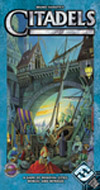 Citadels is a card game for 2 to 7 players in which each player is attempting to build 8 city districts by paying gold to play cards in their hands. At the start of each turn players are randomly dealt one of 8 role cards. These role cards are initially held in secret and are revealed in a specific order. Some role cards, such as the thief, allow you to steal gold from other players, other role cards like the Bishop and Merchant earn gold from city districts in play, while Architect has an advantage in laying down new city districts. $15.47 – $19.99 at various online specialty stores.
Citadels is a card game for 2 to 7 players in which each player is attempting to build 8 city districts by paying gold to play cards in their hands. At the start of each turn players are randomly dealt one of 8 role cards. These role cards are initially held in secret and are revealed in a specific order. Some role cards, such as the thief, allow you to steal gold from other players, other role cards like the Bishop and Merchant earn gold from city districts in play, while Architect has an advantage in laying down new city districts. $15.47 – $19.99 at various online specialty stores.
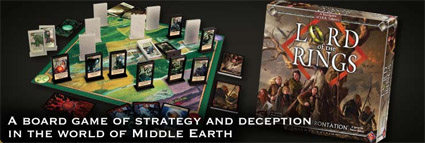
I’m cheating a bit with this one, technically this game only qualifies for the list because Fantasy Flight Games has made it a part of their holiday sale for $20 but it’s too good a game to pass up. Lord of the Rings: the Confrontation Deluxe Edition is a two player game created by acclaimed game designer Reiner Knizia, with character and card illustration by famed artist John Howe. Game play is vaguely similar to the classic game Stratego, one player controls the Free Peoples of Middle Earth, the other player commands Sauron’s forces. The Free Peoples must drive the ring to Mordor on Sauron’s side of the board while Sauron must either capture the ring or drive three dark creatures into the Shire on the Free People’s side. Each piece/character possesses special abilities, strategy is further deepened through the play of cards. $20 from Fantasy Flight Games.
When not playing games, Bob Gallo is a computer programmer specializing in Flash and interactive application design living in the Charlotte, NC area. Bob got his gaming start in the mid 1970s with traditional hex-and-counter war games and has played nearly all types of games including role playing games, miniatures, collectible card games, video/PC games as well as traditional board and card games.










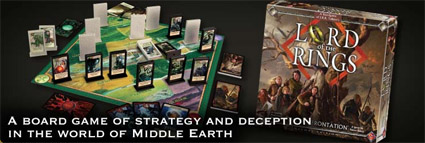
I don’t know about the other games on this list, but I would HIGHLY recommend the Fluxx games. All of the games in the Fluxx line are fun, but Martian and Zombie are fantastic. They’re fun, (usually) fast, quirky and they still allow the players to have a conversation about something else while playing. They are absolutely wonderful social games.
Thanks for this tip, I just got 8 gifts from the Fantasy Flight sale …
I reccommend the game Citadel. Relatively easy to learn, concept can be enjoyed even by non-SFF geeks, good in large groups, etc.
Dude — You just gave me a huge Hero Quest craving. (“I search for traps, treasure, and secret doors!”)
Also, my all time favorite sci-fi games: Solar Quest and The Omega Virus! Probably not under $20 anymore, but those were the days. We almost played Solar Quest at Thanksgiving this year, but then we realized we were talking about playing a game of Solar Quest.
The FFG sale has some amazing deals on games over $20 (no dungeon crawlers though, sorry). I blogged about Android which they have for $25, Age of Conan may show up in a future blog and is marked down from $79.95 to $25, Tribune isn’t science fiction or fantasy but it’s still a great game, particularly for $15.
As for Fluxx, they are great games. I didn’t mention it in the post but Fluxx games can be found in-store at some Barnes & Nobel and Borders book stores.
I picked up Space Hulk: Death Angel a few weeks ago when I was on a trip. I was skeptical of it being 1-6 players, because I hadn’t seen any games like this that were fun solitaire. I got it out anyway to learn the rules and found that it is the best solitaire strategy/fun game I’ve ever played.
I haven’t even played it with other players yet…
I was skeptical too but I’ve played it up to 5 and it works well, I don’t see any problem up to 6. My preference is for 2 or 3; having 2 combat teams per player reduces the possibility of player elimination until the entire squad is about to be overrun.
I am not a 40K or Space Hulk player but I’ve introduced this to people that are with great success. They love how tactics from the full sized game seem to work in the card game, mostly they’ve taught me not to shoot at every opportunity. If there’s only a single Geanstealer in your sights it’s often far better to take a support action and save the fire option, the value of the special support actions are often overlooked.
You don’t credit the designers for most of these games. Would you list books without crediting the authors?
Good to see you covering analog games, though.
I agree, I’d like more people to pay attention to designers but these descriptions were intended to be brief and for a mixed audience of gamers and non-gamers. For the sake of completeness, here are the US Publishers and lead designers.
Space Hulk: Death Angel
Publisher: Fantasy Flight Games, Designer: Corey Konieczka
Forbidden Island
Publisher: Gamewright, Designer: Matt Leacock
Pocket Rockets
Publisher: Asmodee Editions, Designer: Antonie Bauza
Onirim
Publisher: Z-Man Games, Designer: Shadi Torbey
The Stars are Right
Publisher: Steve Jackson Games, Designer: Klaus Westerhoff
Dungeoneer Series
Publisher: Atlas Games, Designer: Thomas Denmark
Fluxx Series
Publisher: Looney Labs, Designer: Andrew Looney
Perry Rhodan: The Cosmic League
Publisher: Z-Man Games, Designer: Heinrich Glumpler
Citadels
Publisher: Fantasy Flight Games, Designer: Bruno Faidutti
Lord of the Rings: Confrontation
Publisher: Fantasy Flight Games, Designer: Reiner Knizia
The roles in Citadels aren’t randomly dealt out; they’re secretly chosen by the players. All of the fun in the game is trying to second-guess who chose which role.
My bad, it’s been a while for Citadels. Yes, to clarify, (let’s face it, to correct):
The player with “the crown” (determined randomly at start, moved to the King character thereafter) draws from the character deck first and passes the deck left. One hidden card has been removed from the deck and a certain number of face up cards may also have been removed. This means the first player knows with almost 100% certainty what roles will be in play for the turn but doesn’t know who has them (depending on the player count there may be 1 extra card not in play), the next player to draw will know with 50% probability what character the first player has chosen and so on. Certain characters exist solely to screw other characters so it becomes an interesting game of bluff and deduction when trying to precisely target your screwage (or avoid being screwed) and still make progress on building districts.
As said by SaltMan, it’s the interaction between characters and trying to guess who has what that makes this game. For this reason, Citadels shines with lots of characters in play, one attribute that makes this game a rare gem is that it plays best in its upper range of player count.